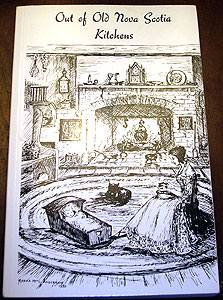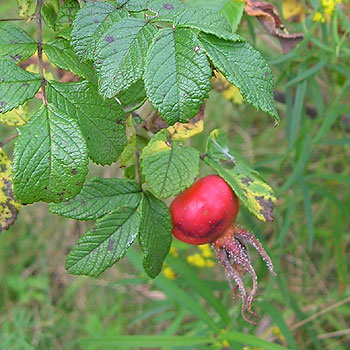
Among the more interesting informational tidbits: wild ducks have a "fishy" taste to them (I didn't know that) - to get rid of it, parboil the duck with a peeled carrot inside it 15 minutes, then remove the carrot and soak the duck in fresh water for a half hour (pg. 65). And, when you went blueberry picking in the old days, you had to light a small brushfire nearby to keep bears away!
One interesting recipe was for Head Cheese. *shudder* To quote:
Step 1. Cut up the pig's head and remove all the undesirable parts.
Okay, already you've lost me. To me, the entire head is undesirable! I'm thinking this recipe is probably not for me...I don't think a little summer savory is going to save it, either. It is fascinating to read about though, and see how absolutely nothing was wasted (except eyeballs, I guess).
But there's other kinds of "cheese" in this book that sound really delicious, and more in keeping with modern tastes:
Scotch Cheese
Line a pan with cut-up cheese and add chopped onion, using enough to cover the bottom of the pan thinly. Beat 2 eggs with 1 1/2 cups of milk, and pour over the cheese and onion. Season with salt and pepper to taste. Bake in a moderate oven (350 deg F) about 1/2 hour or until dish is set.
© Out of Old Nova Scotia Kitchens
But it's not all turtles in the shell, or wild eels (with instructions on how to skin them) - there's lots of recipes for pies, cakes, meat pies, breads & preserves.
 As I've mentioned before, Nova Scotia has a gorgeous wild rose that grows practically everywhere. After the roses are finished blooming, you're left with beautiful rosehips, bursting with Vitamin C (very important for early settlers to avoid scurvy). They have an interesting recipe for rose hip jam that I hope to try sometime.
As I've mentioned before, Nova Scotia has a gorgeous wild rose that grows practically everywhere. After the roses are finished blooming, you're left with beautiful rosehips, bursting with Vitamin C (very important for early settlers to avoid scurvy). They have an interesting recipe for rose hip jam that I hope to try sometime.Rose Hip Jam
2 lbs fresh rose hips
1 1/4 cups water
1 cup sugar (or more)
Remove stems, seeds and blossom ends from rose hips. Wash quickly. Bring to boil and simmer, cover for about 1/2 hour or less, until tender. Strain through a sieve and weight the pulp. Add 1 cup sugar for every pound of pulp. Bring to a boil, stirring continuously, and boil for 10 minutes. Pour into hot sterilized jars, cool and seal (or seal and cool, depends on your sealing method). :)
© Out of Old Nova Scotia Kitchens
I also discovered that Germans made Carrot Pudding instead of the British Plum pudding for Christmas. I'm not a huge fan of the Plum Pudding, but I'm sorely tempted to try Carrot Pudding as a little celebration of my heritage. We'll see! :)
It's really neat to try recipes that have been handed down through Nova Scotian families for a couple hundred years - there's a great feeling of being part of a chain, extending from the past through to the present.
From a cultural and a culinary perspective (but then again, how much of culture IS food?), this book is a highly entertaining and enlightening read.

 The Family
The Family
4 comments:
Not all wild ducks taste fishy. It depends on what they eat...or so I was told just last week when we toured the Lake Martin swamp in Louisiana.
Heh heh heh - well, I know about as much about wild duck as I do about nuclear physics - not much! :) They could say they taste like cheddar cheese, and I wouldn't know any better. :) The only duck I've ever eaten were raised by my Gidu.
Hope you had fun on your swamp trip! Bet you saw a lot of cool stuff there, swamps are fascinating ecosystems!
You are correct,sea ducks are very fishy because... that's about all they eat.In the old days we soaked the cleaned ducks in a solution of baking soda for a couple of days prior to stuffing and roasting and then strips of bacon or fresh pork were placed on the the bird and as it cooked it basted itself,served with the usual winter veg and gravy,mmmmmm.
My mom has a copy from 1971 and the back cover has had a burner mark in it since i can remeber .. she is planning on leaving it to me when she passes along with all her other cookbooks( which are hard cover scribblers full of good old fashioned recips ) which i can convert to sugar free for my son who is diabetic:) My fav recipe is the Old fashioned griddle cakes.. when my son sees me grab the cookbook he knows he's getting pancakes:)*LOL*
Post a Comment